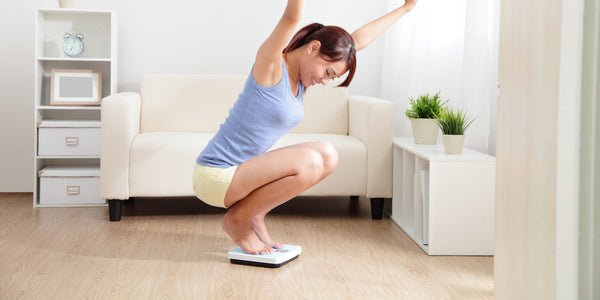
Moms and Daughters - Exercise and Family Participation
Most people agree that kids don't get enough exercise nowadays, and experts give a variety of reasons for that. It's interesting to see the reasons KIDS give.
I'm Dr. Caroline Cederquist, giving you the Skinny on Your Health.
A recent study surveyed 9 to 11-year-old girls about their exercise habits and what they perceived as barriers to their participation in exercise activities.
The study sought to contrast overweight girls and normal-weight girls and see how their perceptions and attitudes differed.
But the most important finding might be a SIMILARITY rather than a difference.
The BIGGEST barrier to exercise - for BOTH groups - wasn't about access to facilities, or that their friends weren't doing it, or even that they plain old didn't want to.
The girls' MOST REPORTED reason for not exercising was that their FAMILY usually didn't do it together.
It's just more evidence of the profound influence parents can have in correcting a child's weight problem - or preventing one to begin with.
Women's Activity Levels
It's errands here and laundry there and wipe a nose and button a coat. All moms are working moms, and recreational time is hard to find for today's multi-tasking mothers.
I'm Dr. Caroline Cederquist, giving you The Skinny on Your Health.
But the challenge of finding time is only half the battle. Too often, once she's found that time, all the busy mom wants to do with it is grab a breather. Many report that the last thing they feel like doing is exercise.
National Center for Health Statistics data show that once women hit their reproductive years, their recreational activity drops sharply.
That's not good, because when Americans reach their advanced years, women are more likely than men to require personal care from someone else.
And the less active we are in midlife, the more we're at risk of needing that care. Nursing homes are filled with the busy moms of yesterday.
Make it a point to care for you, too, Mom. A little more activity today can make a big difference later.
Women's Weight and Sugared Drinks
There's a joke that goes… diet sodas must make people fat, because it seems that only overweight people drink them.
I'm Dr. Caroline Cederquist, giving you The Skinny on Your Health.
Of course, it's not true, but there's a grain of truth in that one-liner. Sweetened soda intake in the U.S. increased by 61 percent between 1977 and 1997. During that same period, the number of Americans who are overweight or obese increased by roughly the same amount.
And now a new study of beverage consumption habits shows that women who increased their sweetened soda intake also increased their weight over an eight-year period.
Now, here's where the comedian gets his goods: women often do make the switch to diet sodas, but that switch usually doesn't occur until AFTER the weight gain has already happened, along with specific metabolic changes that make continued gain more and more likely.
If you've got the soda habit and can't shake it-at least make the switch to diet. You could spare yourself hundreds of empty extra calories every day.
Fat Stereotypes in Girls
You know the stereotypes about fat people: they're lazy, unhappy, and lonely. In America, these stereotypes develop early, and they're just as prevalent in the thinking of overweight kids as anyone else.
I'm Dr. Caroline Cederquist, giving you the Skinny on Your Health.
But recent research among 9-year-old girls and their parents found that if the girls themselves had already been encouraged by their parents to lose weight, they were even more likely to have negative attitudes about overweight people in general.
So if little Susie actually is overweight, what is that saying about her own self-esteem?
There's a balance that has to be struck. We don't want to make kids-or anyone else, for that matter - feel badly about themselves.
But we have to teach kids about excess weight and the health issues associated with it. We can't just not talk about it.
That's why it's so important to separate weight from the character stereotypes about fat. Kids need to understand that their weight really does impact their health, but it really doesn't say anything about their character.
Overweight and Dementia Risk in Senior Women
Doctors used to think there was little point in encouraging weight loss among overweight folk of advanced years.
I'm Dr. Caroline Cederquist, with Get The Skinny on Your Health.
A recent study shows that in women over 70, there's a steady increase in the incidence of Alzheimer's disease, corresponding with increasing levels of excess body weight.
The specific reasons for the correlation aren't clear, but studies do show that increased blood sugar levels affect memory, and excess weight does lead to various blood sugar disorders, such as diabetes. Excess weight also increases the likelihood of stroke, which has been shown to cause other kinds of dementia.
Since many people worry much more about keeping their minds sharp as they age, seeing how interwoven our mental and physical health are should give yet another reason to take proper nutrition and fitness seriously, not just for weight loss, but for overall quality-of-life.
American Women Exercise Less than Men
American women seem to care less about their fitness, or at least, they seem less inclined than men to do something about it.
I'm Dr. Caroline Cederquist, with Get The Skinny on your Health.
A study from The National Center for Health Statistics says women exercise less than men at any life stage.
Even in the youngest, most active group, those aged 18 to 24, only 32 percent of women make a point of getting regular physical activity, as compared to about 45 percent of men.
Remember, this is not activity associated with work. Men do hold more physical labor jobs and would be expected to get more physical activity in the workplace. But this is about optional, recreational exercise, and women seem to be opting out.
It's probably no coincidence then, that when Americans reach our advanced years, women are more likely than men to require personal care from someone else.







